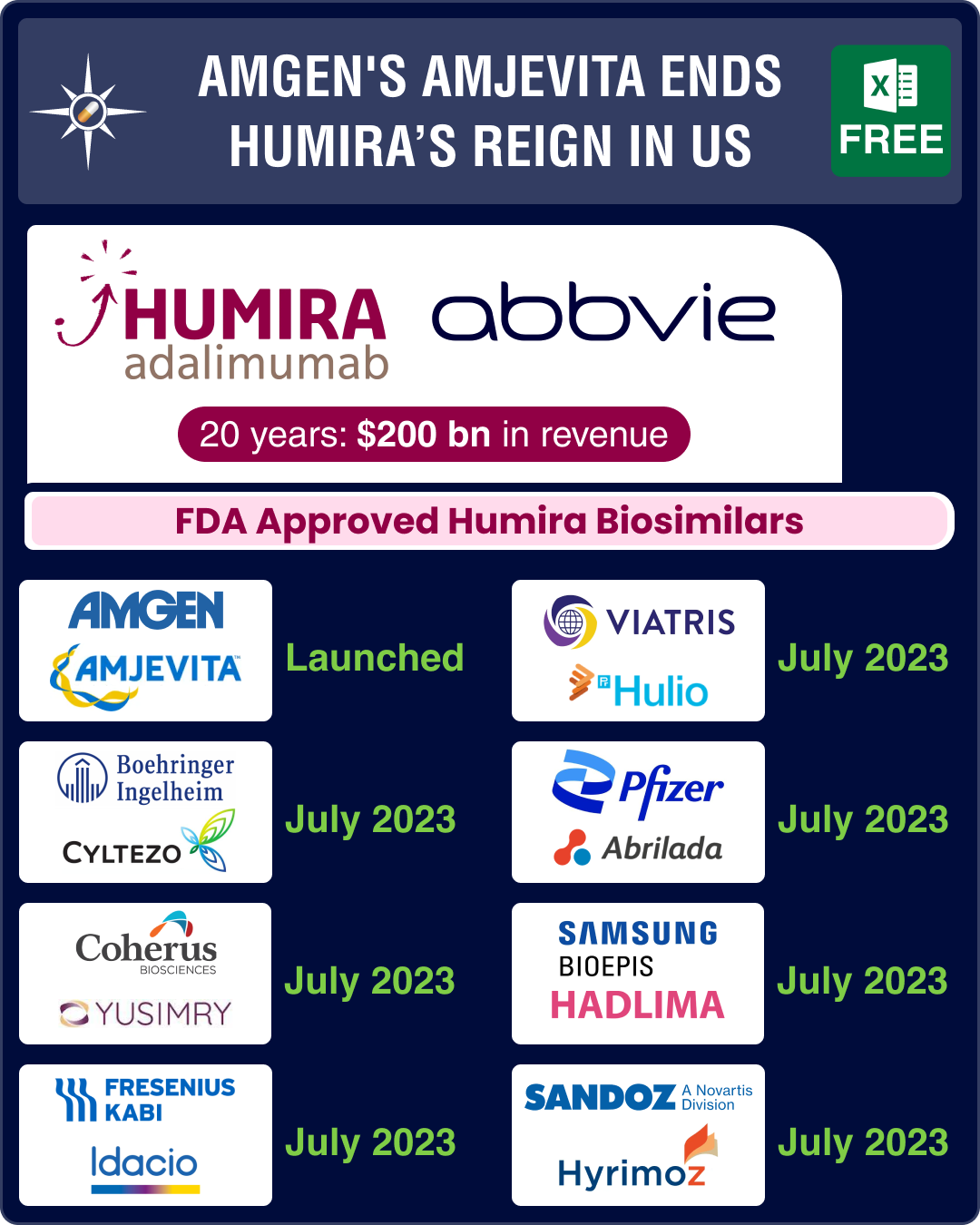
By PharmaCompass
2023-02-02
Impressions: 2251
This week, AbbVie’s Humira (adalimumab) saw its 20-year exclusive run come to an end in the United States as Amgen launched its copycat — Amjevita. This is just the start of the onslaught of Humira copycats, as seven other biosimilars are due to be launched this year.
In a press statement, Amgen said Amjevita (40 mg) is available in the US at a list price (wholesale acquisition cost) 55 percent below the current Humira list price. According to a Reuters report, Humira’s US list price is US$ 6,922 per month. The biosimilar is also available at a list price 5 percent below the current Humira list price.
“Amgen’s goal is to provide broad access for patients by offering two options to health plans and pharmacy benefit managers,” the company said.
Blockbuster that’s brought in US$ 200 billion so far
Humira had bagged the US Food and Drug Administration’s approval in 2002. Back in those days, it was a part of Abbott. The drug had been developed by a division of BASF Pharma, known as Knoll Pharmaceuticals. Abbott had acquired Humira through its purchase of Knoll in March 2001. In 2013, Abbott completed the separation of its research-based drugs business into an independent biopharmaceutical company — AbbVie.
Humira is a tumor necrosis factor (TNF) blocker indicated for inflammatory diseases such as rheumatoid arthritis, juvenile idiopathic arthritis, psoriatic arthritis, ankylosing spondylitis, Crohn’s disease, ulcerative colitis, plaque psoriasis, hidradenitis suppurativa and uveitis.
From 2012 to 2020, Humira was the world’s top selling drug. In 2012, it ousted Pfizer’s cholesterol drug Lipitor from the number one spot. AbbVie reported Humira revenues of US$ 19.2 billion in 2019 and US$ 19.8 billion in 2020. The drug brought in US$ 2.7 billion for AbbVie in 2021. However, that year, it lost its top-selling drug status to Pfizer’s Covid-19 vaccine Comirnaty.
Since its approval in December 2002, Humira has brought in over US$ 200 billion for AbbVie. Last year alone, the drug had delivered sales of US$ 15.6 billion until September 30, accounting for approximately 36 percent of AbbVie’s total net revenues. It is still a top-seller among non-Covid drugs.
Humira’s controversial patent thicket
The original patent that covers Humira expired in 2016. Post that, FDA approved eight biosimilars for Humira. These are Amgen’s Amjevita (approved in 2016), Boehringer Ingelheim’s Cyltezo (2017), Sandoz’s Hyrimoz (2018), Samsung Bioepis’ Hadlima (2019), Pfizer’s Abrilada (2019), Viatris’ (earlier Mylan) Hulio (2020), Coherus BioSciences’ Yusimry (2021) and Fresenius Kabi USA’s Idacio (2022).
At present, Cyltezo is the only FDA-approved interchangeable biosimilar, giving it an edge over others since it can be substituted for Humira without a doctor's advice. However, this advantage may be short-lived. FDA is reviewing applications for interchangeability of Abrilada, Pfizer's approved product, and AVT02, Alvotech’s biosimilar under review. FDA is expected to announce its decision on AVT02 in April.
Even though Amjevita was approved in 2016, it wasn’t launched in the US as AbbVie used a strategy known as a “patent thicket” wherein the company applies for multiple patents in addition to the original one.
Post that, AbbVie faced class action and antitrust lawsuits from grocery workers’ union and welfare-benefit plans. In 2019, welfare-benefit plans that pay for Humira sued AbbVie in Chicago federal court, alleging its patent collection created an illegal monopoly by scaring off potential competitors.
In June last year, a bipartisan group of US senators asked the US Patent and Trademark Office to look into curbing the patent thicket. However, in September, a US appeals court ruled that AbbVie’s use of a patent thicket did not unlawfully block competition. Humira’s last patent will expire in 2037.
Our view
Post the launch of Amjevita, several analysts have talked about how cost savings due to the launch of biosimilars are expected to be limited given the complicated system of insurance, middle men and rebates in the US.
According to a March 2021 report brought out by the National Bureau of Economic Research, “competitive forces yield important price reductions as the number of competitors increase.”With each biosimilar entry, weighted average price ratios can fall anywhere between four and 10 percentage points, the report adds.
Often, the originator drops its price. In Europe, AbbVie had offered up to 80 percent discounts in November 2018, a month after Humira went off patent. It will be interesting to see how AbbVie counters the onslaught of biosimilars in the US.The PharmaCompass Newsletter – Sign Up, Stay Ahead
Feedback, help us to improve. Click here
Image Credit : AMGEN LAUNCHES 1st HUMIRA BIOSIMILAR IN US by PharmaCompass license under CC BY 2.0
“ The article is based on the information available in public and which the author believes to be true. The author is not disseminating any information, which the author believes or knows, is confidential or in conflict with the privacy of any person. The views expressed or information supplied through this article is mere opinion and observation of the author. The author does not intend to defame, insult or, cause loss or damage to anyone, in any manner, through this article.”








